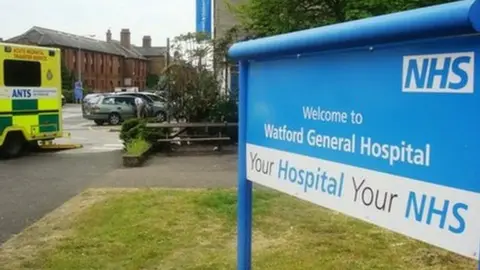Brain damaged boy, 6, awarded £37m in NHS compensation
 West Hertfordshire Hospitals NHS Trust
West Hertfordshire Hospitals NHS TrustA six-year-old boy who suffered a "catastrophic" brain injury after his birth in hospital has received £37m in compensation from the NHS.
The child contracted the herpes simplex virus at Watford General hospital, which led to a brain fever.
His barrister, Henry Witcomb QC, told London's High Court the virus "was not detected and acted upon" soon enough.
West Hertfordshire Hospitals NHS Trust had previously apologised and agreed to settle his case.
The boy's solicitor said the payout was the "highest award ever" in a clinical negligence case against the NHS.
The court heard there was a two-day delay in giving the boy an antiviral drug.
It resulted in "catastrophic damage to his brain" which caused eyesight and communication problems, cognitive and movement difficulties as well as behavioural issues.
"The effects of the negligence have been tragic both for the boy and his family," Mrs Justice Lambert said.
She told the court the Trust admitted liability for what happened to the boy at an early stage and had agreed to settle his case.
'Acutely sorry'
The boy will receive a lump sum payout, plus annual, index linked and tax free payments to cover the costs of the 24-hour care he will need for life.
Mr Witcomb said the value of the settlement, calculated over the boy's lifetime, comes to more than £37m.
The chief executive of the trust apologised to the boy's family in a letter sent in May 2017.
The trust's barrister, John Whitting QC, said: "The care which he received was not of an appropriate standard and for that we are acutely sorry."
He added lessons had been learned and steps had been taken to ensure "nothing similar will ever happen again".
After the hearing the boy's solicitor, Paul McNeil, said: "While we recognise that this is the highest award ever made against the NHS, our hope is that such accidents will never be allowed to happen ever again in the future."
